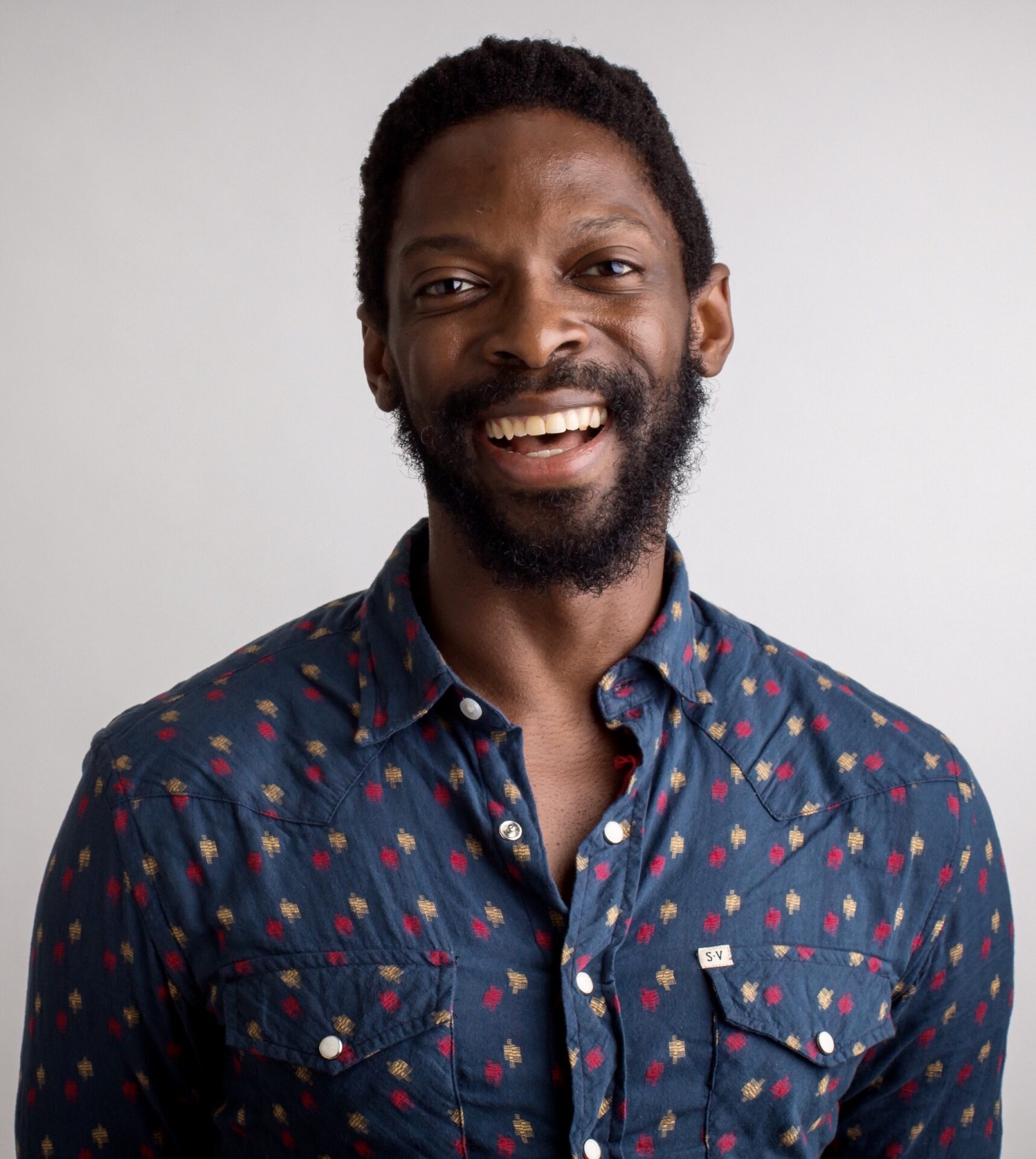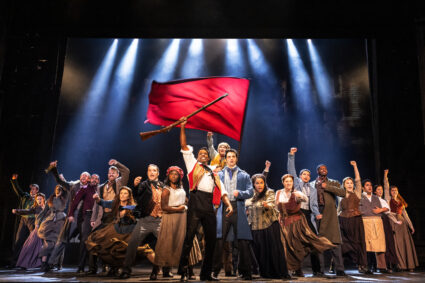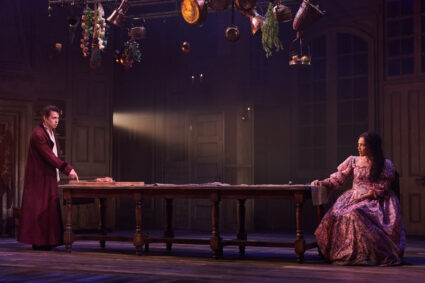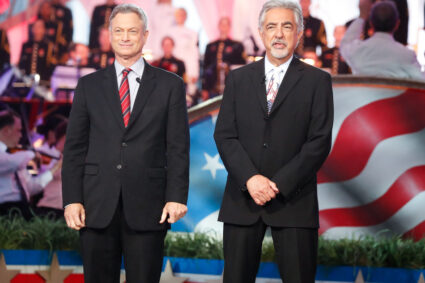
On this episode, we are continuing our saga of interviewing the cast of this upcoming epic adventure that is happening at the National Building Museum. It’s one of William Shakespeare’s most magical and beloved comedies, “A Midsummer Night’s Dream”.
And on this episode, our guest today he describes himself as an actor, a writer, a director, a teacher, and an adventurer, and he will be playing the mighty Oberon, who he describes as the king of the fairies, and he’s also playing Theseus which is coming to the National Building Museum through August 28th.
Ladies and gentlemen, we have the King Oberon and Theseus Rotimi Agababiaka!
You just mentioned moments before we got talking that this is your very first time in our nation’s capital. That is amazing!
It is. Very, very amazing. Great to be here.
Yes, so what sites have you seen so far here?
Well, I did some biking around performing Capitol Hill area. I get to bike past US Capitol and, on my way, to work. And I’ve also been to the National Mall. I started going to the Washington Monument and Lincoln Memorial and some of the museums around here. I’ve seen quite a bit in the past few weeks.
And I hope you get to enjoy some of the sights, some of the sounds and some of the great food that we have to offer here. In this production. You’re playing both Oberon the King, and you’re playing Theseus in a Midsummer and I want to know your fascination with these two characters that you are about to bring to life in the next few weeks.
Yeah, so Theseus is the Duke of Athens. He’s the leader of Athens, which is the city that in summer begins and, of course, over the course of the play, there are some people in the city who are being oppressed by the city’s gonna be harsh laws regarding love and regarding parental control, near the lovers escape, because one of them her father wants her to marry somebody else and will kill her and you know, that obey Him.
Theseus is kind of the enforcer of this really harsh society. And then the lovers escaping go to the forest where the rules don’t apply. And Oberon is the king of the berries and he sort of the ruler of fish. The other region where anything goes. It’s really fun to get to play these two leaders who are so different. But also have some similarities. They’re both in these romantic relationships where they’re kind of in a bit of a conflict with their partner. It’s fun to play, you know, the human, kind of patriarch, and a fairy. He’s going through some of the same concerns, but exploring them in a very different way.
It’s great to talk to an actor who plays multiple roles in the play. I have done that once in my life, I played Bob Cratchit, The Ghost of Christmas Present and Jacob Marley in A Christmas Carol. The good news is that I was able to survive that performance. The bad news is I drove my folks nuts for about few weeks because I had to do it at the time in British accents. So, I had to do three different British accents for these characters. When did your fascination of the bard of Avon began and your exposure to this wonderful craft, we call live theatre?
Yeah, so it happened when I was in college, I went to the University of Texas at Austin. I was an English major English and Economics. I was gonna go to law school, after college. But there’s a wonderful program. It’s called Shakespeare at Winedale. It’s this program that takes a few students out into the Texas Hill Country to the countryside, where there’s this historical society with a 19th century barn that’s been turned into a theater.
And the students stay there for about nine weeks and they perform three Shakespeare plays, make our own costumes, put them all together and perform them in a reparatory for a few weeks. And so, I did this program in my college kind of college and I was, that was when I was hooked. We just I learned to love Shakespeare I learned how accessible Shakespeare is how much you know, he was writing for the people. And if you really embrace the language as a performer and realize that it’s not something for like a stuffy museum, but it’s something that can still really relevant to people today, writing about human beings through human things that we can all relate to.
Once I really understood that the playfulness and all the fun and subversives of his work, I was in love and from then on. I’ve been in love with Shakespeare, and that was experienced that made me decide that I wanted to be a professional actor. So, to my parents, chagrin, I ended up not going to law school, or going on to study acting. And now I am a professional actor.
The fascination with Shakespeare is such amazing, especially since I grew up listening and playing and being part of the Shakespeare phenomenon. What is your favorite play and your favorite character from Shakespeare?
Great question. I think Midsummer Night’s Dream is actually my favorite play. It’s just like you can’t you can’t mess it up. It’s got everything it’s got fairies. It’s got lovers. It’s got the root mechanicals where these wonderful like working class people who are putting on this way just to cover such a gamut. So that is one of them. Not anything. And in terms of characters, I think which is my favorite. I love a good villain and he’s just such a delicious everyone. That the “Midsummer Night’s Dream”, “King Lear” and “Richard III the character,
Everyone loves to play but have you actually played Richard third at one point in your career?
I’ve never had but one day I will.
Now we’re going to talk a little bit about your teacher because most recently, you completed a term as a lecturer in acting and solo performance at Stanford University, which is amazing. So, I like to know what did you teach our future thespians for this semester?
Terrible, terrible things. LOL Well, yeah, like going back to the fall. I teach courses in acting. And I also teach a course in which my students create their own solo shows, because I do a lot of solo performance. And so, I mean, I feel a component fast my students over the course of 10 weeks, we developed and devised individual pieces for them and they performed solo pieces by the end of the course.
So that’s one of the main things I do and then I also teach acting, in that, you know, we’re doing physical stuff or learning how to listen to and respond to each other how to really do give different circumstances of play and really awaken our imaginations and our bodies to be able to express at a present with another person on stage with the audience around us. So those are the main things I teach at Stanford.
How many years? Have you been teaching at Stanford?
I just started this January. So, this is my first year. And I’ll be going back in the fall. So, I just got started. And I’m happy to.
That is great. Well, as you well know, many people can be daunted by classical theater, because the language can be difficult and they think that work from centuries ago, cannot resonate into the 21st century. I want you to share any tips for members of the audience who are coming to see this play, who want to engage in these classical pieces?
Yeah, my biggest advice is come prepared to have fun. Don’t think that, you know, homework doesn’t come, you have to like write an essay about it afterwards. With the same spirit, you would come to see, like our Bible superhero movie, because especially in our production, I think in any good production, we are very committed to making the language understandable. And realizing that that’s really what it’s about. But it’s not about like, “Oh, this is Shakespeare, it’s so important.” No, it’s about lovers who are fighting in the fall as they’re falling along with the wrong person.
They’re jealous over or, you know, infidelity. It’s like it sort of play or movie that you’re seeing, you know, that was made yesterday, it’s all the same thing. And if you just come along for the ride, if you look at it, you may not understand every single word, but you will understand what’s happening. And when you see the costumes and the music, we have to show at the dance. It’ll just be a wonderful, fun time. Just don’t think of it as you know, “oh, Shakespeare, it’s so important.” It’s not important. It’s fun.
And if it wasn’t for Shakespeare, we would never have these modern-day epic battles that we take for granted. And that are sometimes two and a half to three hours long on film.
Exactly. Our show’s about 90 minutes instead of three hours, but it might have been fun that I think anyone can really understand and enjoy.
Agreed. And, you know, we get to experience that live theater because one of the things that I miss, during the pandemic for those crazy months, which I was at home, looking at movies and Netflix, is live theater. What did you do during the pandemic? How did you keep yourself coping, busy functioning?
A lot of laying on the couch. (laughs) But also, there was a lot of performances of theater happening over zooms and was able to do some things. Also, some things as we got vaccines and got, you know, little more, I was able to do more things outdoors, which is really great. And then thankfully, I mean, I’m able to technology because I was able to continue going to dance classes, virtually during the pandemic, doing voice classes virtually.
So, in that way, I was able to keep working on my craft, and having social interactions with people and able to like you know, take classes all over the world and watch things all over the world because I was able to do it virtually. So that was those were some of the ways that I sustained but I’m definitely so happy to be back doing live theater, there’s no substitute for being in the same room.
That is great to hear. And you also recently participated in the Fab Lab Celebration of Life at the Yerba Buena Center for the Arts out on the West Coast. And you actually lead a play shop about the legendary queer artist, that is James Baldwin. And when I read through your Instagram, you actually got to play him in a production. Tell us about your experience playing Baldwin and during a play shop about him. And what fascinates you about this legend that we’re talking about that people understand and appreciate after all these years?
I guess I’ll start by saying so much since I was a young kid, I remember. My aunt I saw a copy of I think it was your body’s room in her house. I was really young and she was like, “Oh, he’s a really good writer” and she was like “He’s homosexual”. As a young queer kid, I was like “ooooh okay!” Yeah, this is somebody who I understood where I was coming from, like, really enjoyed that kind of touchstone for me throughout my life. And I’ve been very fortunate to get to play him a few different times. The first time was a play that was written by a gentleman called Bob Cooter in San Francisco and part of his queer ancestors’ series.
I performed as Baldwin in that and then I have a solo show called “Manifesto”, where I have a section where I portray, and he kind of comes as a spirit guide to the protagonist in that way. And that’s the last show and then, for this place, A Celebration of Life. It’s part of a series done by SN productions in San Francisco, a gay ancestor series as well, where you do a complete a workshop based on the life of a queer ancestor. And I was able to do this workshop and played James Baldwin, I just lead people in reflecting on his life and working on writing prompts and exercises based on his life and questions, and he was exploring artists.
So, it was just really wonderful to spend time and you know, there’s so much we can learn from someone like it’s so insightful, and so himself at a time when it was much more difficult to speak about these things. And it is now and it really paved the way for us to have the understanding and the acceptance and the freedoms that we have today. So far, he’s just such a light and a guide. For me, as a human being and as an artist,
And I could definitely hear the passion in your voice up playing James, and he is such an icon to all of us here and to hear you play him into a play shop with him with that. Passion is amazing. You’re welcome. Now, Pride Month ended. And it was definitely such a great time especially you went to Broadway, you went to the Pride Parade in NYC. And I want to know, from you as a queer black actor, what society needs to do more, so that we can continue to feel accepted in the LGBTQIA community to keep that momentum going forward.
Yeah, great. That’s a good question. Many things but perhaps the main thing is just to keep not creating space for other perspectives, or their experience, other ways of seeing the world. Being in the world, I think society & political institutions need to be open to other perspectives, other ideas, not thinking things have to be one way always, but learning from other voices, the queer voices, like voices, the voices of women, the voices of working-class people, voices that have been marginalized or ignored.
I think in every venue or wherever one can do that, or, or make that happen in your own way, we should be making space for those voices and listening to those voices. And just continue to create a society where people wherever you live matters, and where every experience, you know, is valid or considered, you know, is considered, at the very least. I think that’s, you know, the general way what I think society needs to keep doing so that we can keep expanding our notions of what is possible and what love is and what humanity can be.
Yes, absolutely right on all counts. I got to ask about the origin of your Instagram handle @Saintrococosalamander. I got to know the origin.
The origin is funny. It’s actually a name in college. My group of friends, we had these drinking names. We had these names that we were we gave each other in some nights. And mine was St. Rococo Salamander and that became my Instagram handle at some point and I get stuck.
No, no, don’t change it. I love it. It’s a great one very unique. Well, my last question is this. What advice do you have for future actors who would love to get into the game would love to be in theater and take on these challenging roles, whether it’s Shakespeare, Ibsen or Tennessee Williams, what advice would you give them?
Oh, I think it’s twofold. Study what you love. So, if you want to do it, you know, what do you love about it? Who do you love it’s doing it excites you? And really, keep ingesting that coin to the show. It’s watching the performances, getting a recording using the books, and study what they do, and what is it about what they do. And it’s exciting to you, how do they do that? Like, what’s the skill, because skill and craft I think is important.
And then secondly, don’t wait for anyone to get permission to do anything. If you want to do it, do it at a time when you look at yourself on camera with your phone, and put it up on YouTube and have an audience or you can you know, go on the street corner from warm so don’t wait for anyone’s permission. Just for the audition, even if you don’t necessarily have an appointment. Make your own video and work with friends, know, do a reading of a play with friends. Don’t wait around waiting permission as an actor make so many things happen with your own fortitude and your own. going for it. So, as I would say go for it and study what you love.
And actually, I just got one more question because this was based on my research of you because I remember going onto your website and seeing one of your video clips, it was from KQED, which talks about your experience when you did your first audition in Chicago. And when that woman told you what she saw in you and she said “gangster” and my heart just dropped. It’s like, “Wow, I cannot believe that. In this industry. There’s still people exist who want to see black people, black men, they’re gangsters.” And I want to hear from you. How did you turn that into the fuel that you’re more than just a gangster, you could play Shakespeare, you could play a superhero? You could play any character, you’re not just the gangster type, but you are a person who can do anything they can and will.
Absolutely thank you. Yes. Well, I wasn’t ready to play that turn that moment, into a moment that I wrote about it performed about lightheaded, it’s hard to disagree, we’re processing it. Yeah, also reminding myself to do something that is very important for all of us, reminding myself that one person’s opinion doesn’t make me who I am or doesn’t define who I am. One person’s shortsightedness is not, you know, kind of doesn’t have to define me.
I think by turning that experience into art, first of all, be able to process it and move on from it. And not have been grateful to, you know, to always believe I think or to keep, you know, having, you know, people in my life who reminded me that, yes, and I can do it all and to have teachers and trade has helped me you know, really be able to create a variety of characters and realize, there’s so much in me as there is in all of us, you know, I can be a murderer, I could be a king, I could be a lover, I could be any of us, I think you just have to keep surrounding yourself with people who will reinforce you, and remind yourselves, that one person’s opinion doesn’t define you.
And the more you focus on what you love, because I just always love I love the transformation. So, I try to go for that and in everything that I do as an actor, and because of that I’ve been fortunate to get to play a variety of roles in my career and just be a gangster.
And by curiosity, what was the play that you turned it into?
“Typecast”
That is the perfect title to describe that moment. I’m so glad that you did it. Rotimi I’m very happy for you.
And my friends if you want to see Rotimi the man the myth, the legend. You got to see him at the National Building Museum for A Midsummer Night’s Dream. It runs through August 28. Tickets will be purchased from the Folger theatre box office at folger.edu/theater. Or you can give them a call at 202-544-7077. But tickets are also on sale at the National Building museums Visitor Center Thursday through Monday from 11am to 4pm


